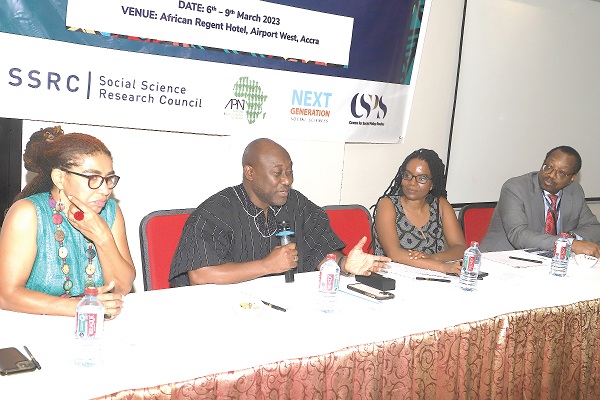
Invest more into research - Prof. Awandare to African governments
The Pro-Vice Chancellor of the University of Ghana in charge of Students and Academic Affairs, Prof. Gordon Awandare, has charged African governments to put more money into research in order to look at issues affecting the continent so as to provide the requisite solutions to them.
Advertisement
That, he said, was because most of the research done was through support from outside the continent and "if you are going to get money from outside then those who fund the research would have a say in what type of research you should do and where you should publish it and all that".
Prof. Awandare said this in Accra last Monday on the sidelines of the opening of the African Peacebuilding Network (APN) and Next Generation Social Sciences in Africa Publications Writing and Dissemination Workshop.
Organisers
The four-day programme was jointly organised by Centre for Social Policy Studies at the University of Ghana and the Social Science Research Council (SSRC), an independent organisation based in the United States.
The participants came from Ghana, Nigeria, Tanzania, Kenya, Uganda, Eritrea, South Sudan, South Africa, Botswana, Zimbabwe, Burundi, Sudan and the Democratic Republic of Congo.
Prof. Awandre said Africans needed to fund their own research and generate the knowledge required, adding that “If somebody funds your research, they would tell you whatever you discover you can’t own it, so you have to share it with them”.
“So we have to fund our own research so that we own the knowledge,” he said,
“So this is where African governments need to think; don’t think about just the next four years/five years or whichever your term of office is.
Let’s think about the future, let’s think long-term and long-term means research, generation of knowledge, ownership of the knowledge and that is what we need to invest in,” he emphasised.
Areas
He said the research could be in the areas of Science, Technology, Engineering and Mathematics, as well as conflicts with a view to finding solution to them.
Africans, for instance, were in a better position to resolve their conflicts since they understood their culture, belief system and factors that drove them.
Prof. Awandare said knowledge generation was critical if African were to be truly independent and that the significance of their independence could not be fully realised if they could not generate their own knowledge and address their own challenges.
Young scholars
A Lecturer at the Institute of African Studies, University of Ghana (UG), Prof. Akosua Adomako Ampofo, advised young scholars to be cautious of collaborations when conducting researches.
That, she said, was to ensure the interests of all parties involved in the research are met and to ensure local participants are not short-changed or disadvantaged.
“As collaborators in a research, we may have the same interests but differences in angles of approaching it, so can we find a way of working around some of these realities on my grounds so that I will not suffer the consequences,” she said.
Prof. Ampofo added, “ you need to read the fine print and make sure it’s something your conscious can live with and that tomorrow, you are not going to have problems with the community you are working with.”
She, therefore, urged the scholars to build networks of support and seek out allies who shared similar goals and values as they do when conducting researches.
An Associate Professor and Director of the Centre for Social Policy Studies (CSPS) at the University of Ghana, Dr Nana Akua Anyidoho, called for closer working relationship with policy makers in achieving the country’s developmental agenda.
She also noted that Ghana had always been a forerunner and a space for Pan-African intellectuals and activists to gather and share ideas for the betterment of the continent and the black race, adding “Dr Kwame Nkrumah started having his own All-Africa Peoples Conference.”
Institutions
The Programme Director of the APN, Cyril Obi, said the APN and Next Generation Social Sciences in African was one of the programmes of the SSRC established in 2011 and 2012.
The APN, he said, supported researchers from conflict-affected African countries to produced field-based research and then answer certain questions related to conflict, peace and security with the hope that the knowledge that was produced would help people understand the nature of conflict and peace and help policy makers and practitioners.
On the other hand, he said the Next Generation Social Sciences in Africa was a programme that supported doctor of philosophy students on the continent who are researching on issues around development, conflict and peace.
He called for an inter-disciplinarian and geographical collaboration to make their studies richer and reach out to a wider audience.



